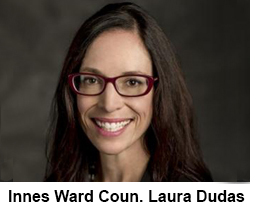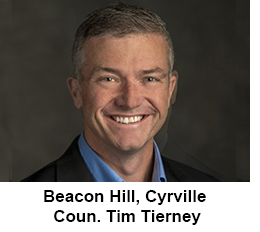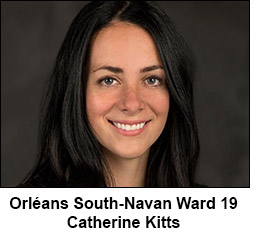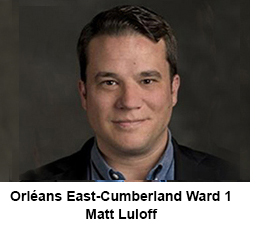Orléans West-Innes councillor excited about the year ahead
As the new year begins, I find myself reflecting – with a touch of nostalgia for the moments behind us and with a deep sense of optimism for what lies ahead.
 It has been over 20 years since my husband and I chose to make the east end of Ottawa our home. Through the decades, we have had the privilege of watching our family and our neighbourhood grow and evolve.
It has been over 20 years since my husband and I chose to make the east end of Ottawa our home. Through the decades, we have had the privilege of watching our family and our neighbourhood grow and evolve.
Having always cared deeply about our community, initially as a community volunteer and now as your Councillor, I have constantly found myself pulled toward ensuring change meant that the east end becomes a better place for us all.
Change can be daunting, but it can also be truly exciting. This coming year is a great example: having only begun, there is already much in store for us, and our community will be continuing to evolve in a way that I think we can all be proud.
My mission has been to see our ward receiving its fair share of investments. In 2026, we’ll see an unprecedented number of residential road renewals and progress on a massive expansion of the Bob MacQuarrie Recreation Complex – Orléans, resulting in a brand-new gymnasium.
We will see the LRT fully extend all the way to Trim. Our community will be even greener with well over 1,000 trees planted at the former St. Joseph Boulevard convent property.
And of course, my favourite part: getting to connect with you at events across the community in celebrating everything that makes this incredible place we call home so special.
Every passing day reaffirms the decision my family made all those years ago to put our roots down here. I’m equally grateful for all of you – the residents whose passion and commitment make our community and our city incredible.
Here’s to a year of progress, connection and shared community pride.
Happy New Year everyone!
Skate smart this winter and always wear a helmet on the ice
There’s something special about skating in the winter. Whether it’s a quiet glide under the lights, a pick-up game with friends or helping kids take their first steps on the ice, skating brings people together and keeps us active during the colder months.
 As the season gets underway, it’s a good time to think about how we can enjoy the ice safely – and responsibly.
As the season gets underway, it’s a good time to think about how we can enjoy the ice safely – and responsibly.
With groundwater levels still recovering, the City is asking residents with private wells to skip building backyard rinks this winter. Maintaining an outdoor rink takes a significant amount of water and can place strain on household wells and nearby water systems. Choosing a shared community rink is a simple way to help conserve water while still enjoying winter activities.
All community outdoor rinks, including those in rural areas that use well water systems, will open this season following consultation with conservation authorities.
The City supports more than 250 volunteer-run outdoor rinks, with opening dates dependent on weather conditions. These rinks offer safe, monitored spaces to skate and are a great way to connect with neighbours. Safety should always come first on the ice.
Frozen stormwater ponds, rivers and creeks may look solid, but they are unpredictable and dangerous. Ice thickness can change quickly, and skating on natural ice can be life-threatening. For everyone’s safety, it’s best to stick to maintained rinks.
Protective gear also makes a difference. Falls happen – even to experienced skaters. Wearing a CSA-certified helmet can help prevent serious head injuries. The City requires children aged 10 and under to wear helmets in indoor arenas, and it’s a smart habit for skaters of all ages.
By choosing safe places to skate, wearing proper safety gear, and looking out for one another, we can all enjoy a fun, active and safe winter on the ice.
Budget season is the culmination of extensive year-round process
When the 2026 draft budget was released a month ago, I made it known I was frustrated. But over recent weeks, I rolled up my sleeves. I believe that real results come from sustained effort, not symbolic gestures. So, I negotiated for our community, improved proposals, and brought forward motions that deliver. Through site meetings with staff, frank discussions with senior leadership, and continued work with the Mayor’s office, we secured important gains.
 Building on this summer’s Transportation Master Plan update, the budget advances detailed design to widen Brian Coburn Blvd. from Mer Bleue to Tenth Line.
Building on this summer’s Transportation Master Plan update, the budget advances detailed design to widen Brian Coburn Blvd. from Mer Bleue to Tenth Line.
It also funds intersection upgrades and key roadwork in 2026, including resurfacing the problematic stretch of Navan Road from past Markinch to Mer Bleue. Sections of Trim and Watson roads will be rehabilitated, and the gravel lot beside the Millennium Park turf field will finally be paved.
The François Dupuis District Park will break ground this year with an important investment of over $12 million.
City-wide, the budget strengthens core services by adding 23 paramedics, 25 police officers, and unprece-dented investments in affordable housing and food security. Through the Service Review and the Agile Government Working Group – on which I serve – the City has achieved over $253 million in cumulative savings, protecting residents from what would otherwise have been a 12% tax increase.
That said, I made it clear during deliber-ations that our ward still needs a larger share of investment to keep pace with rapid growth. Progress on the Renaud realignment, the Innes Transit Priority Measures and the Cumberland BRT has been too slow. To push action, I carried a motion expanding a transportation study to capture Orléans South’s growth in real time.
Rest assured, the work to advance these projects will continue into 2026. I won’t let up.
Wishing you a safe and happy holiday season.
Councillor explains why he voted against 2026 municipal budget
Each year, Council passes a budget that shapes how our city serves the people who rely on us. I approach this responsibility with the same focus I bring to all of my work. Service to the community comes first.
 After weeks of reviewing the document, meeting with staff, and listening to residents, I reached the conclusion that I could not support the 2026 municipal budget. This decision was not about politics or personalities. It was about accountability, fairness, and making sure people in Orléans East – Cumberland receive the value they deserve.
After weeks of reviewing the document, meeting with staff, and listening to residents, I reached the conclusion that I could not support the 2026 municipal budget. This decision was not about politics or personalities. It was about accountability, fairness, and making sure people in Orléans East – Cumberland receive the value they deserve.
Residents are being asked to shoulder a tax increase well above inflation at a time when the cost of living continues to rise.
When Council asks more of families, we must show that every dollar is spent responsibly and that each part of our city receives its fair share. Too often, that is not what people in the east experience. Long-planned projects face delays, key roads like the 174 remain under pressure, and growth continues to outpace the infrastructure needed to support it.
Some people may criticize me for supporting the Lansdowne plan while voting against this budget. The comparison is not valid. At Lansdowne, the private partner is covering sixty nine percent of the cost while the city is responsible for the remaining thirty one percent. This model limits the burden on taxpayers while renewing an important city asset. A municipal budget is different. It draws directly from residents and must meet a higher standard of fairness, clarity, and value.
I have worked hard over the last seven years to secure real investments for our community, and it is my job to hold staff accountable when commitments do not materialize. My resolve remains strong. I will continue to fight for the investments, services, and infrastructure our community needs. When something does not meet the standard residents expect, it is my responsibility to say so. That is why I voted against the 2026 budget and why I will keep working for better results.